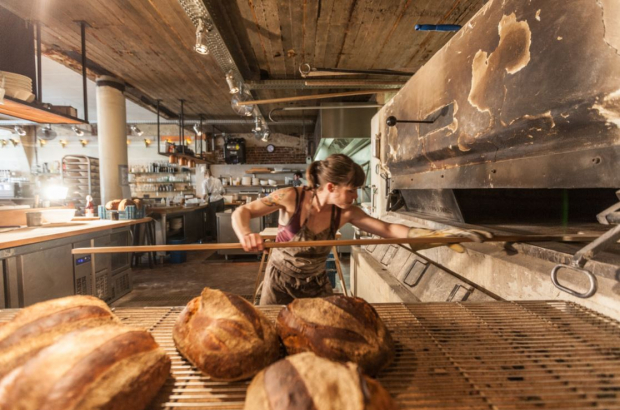- Daily & Weekly newsletters
- Buy & download The Bulletin
- Comment on our articles
Artisan bakeries are on the rise in Belgium
With the first breads reportedly being made about 14,000 years ago, it’s one of the oldest man-made foods. Often dubbed ‘the staff of life’, it has been a staple food through the ages, and almost every culture has their own variation of the flourwater-mixture. And while bread has remained popular, the way it is produced has changed significantly since its invention – something that more and more food-lovers are becoming aware of.
Industrial bread manufacturing has little to do with the original technique. To dramatically reduce the lengthy fermentation period and ensure a batch of bread can be blended, risen and baked in just a few hours, all sorts of dough improvers, preservatives and flavour enhancers are added into the mix. Other common culprits are bleached flour, colouring, emulsifiers and mould inhibitors.
But a growing group of bread enthusiasts have had enough and are willing to put up with the complexity and time-consumption of artisan bread-making, embracing approaches that are as natural as possible, in the most traditional way possible. This new appetite for bread baked the ancient way has given rise to a new breed of micro-bakeries.

Its latest manifestation is Boulengier in Brussels’ Saint-Gilles neighbourhood, where, at the time of visiting, the queue of customers almost extended on to the pavement. It’s the brainchild of friends Christopher Moloughney and Marc Paeps, who gave up their jobs in communication and advertising to team up with a French baker specialising in the old, original way of bread-making.
“The idea was born out of necessity,” says Moloughney. “It’s so hard to find proper bread in Brussels. I’d have to take the car and drive quite a bit to find a good bakery that makes real bread; that is tasty and that respects the original process.” Consequently, Boulengier’s breads are additivefree, freshly baked every day, and even the yeast or sourdough starters are homemade. “The creation of natural yeast takes weeks,” explains Moloughney. “Every baker has their own secret recipe. They take care of it every day and it continuously evolves. Legend says they even go on holiday with it, because otherwise it might die.”

The Antwerp equivalent is Bakker Aldo, a bakery run by twentysomething siblings Sheena and Diego De Pauw. “We wanted to do an honest, healthy product. Water, flour, and yeast are the sole ingredients. You actually have to search quite a bit to find a mill that sells pure flour without any additives,” Sheena explains.
But why does that make such a difference? Are there really that many benefits over mass-produced bread? “The longer the dough rests, the fuller the taste – and our dough rests up to 24 hours,” she says, adding: “The bread is denser and more filling, has more nutrients, and is even better for your digestion.” Aldo’s signature bread is the petit épeautre, made from spelt, which was widely used until the Middle Ages before it was replaced by wheat.
The trademark bread of Charleroi’s Manufacture Urbaine, which is two years old, is entirely baked the artisan way while boasting an additional, very Belgian ingredient: their home-brewed beer, which adds a special taste as well as a different colour. “We wanted to go back to the basics, offer something healthy, and carry on a craftsmanship tradition,” says baker Nathalie Vermeulen.

While the project has been wellreceived by tourists and locals alike, it’s not always effortless, she says. “Due to the high-quality ingredients and the long production process – up to 48 hours – the prices are of course higher than at the supermarket, which can make it a bit tricky. But once people have tried our bread, they come back. And many of our clients are very interested in food and seek us out specifically.”
Meanwhile in Ghent, American-born baker Sarah Lemke takes the artisan matter to the next level. At De Superette, the bread is baked in a traditional woodfire oven. “I have to fire up the oven the night before, I can only bake so many loaves at a time, and there’s no steady temperature,” she points out. “It’s like alchemy – the dough, the temperature, everything needs to be meticulously balanced.” Why go through this laborious ordeal? “I have a very special relationship with my oven; I love it. And I want to help keep this ancient skill alive. It’s a lot of hard work, but the appreciation of the customers keeps me motivated.”
With so many of these bakeries championing natural, traditional methods emerging all throughout Belgium, there’s probably an artisan bakery near you. And if not, it might just be time to roll up your sleeves yourself: the bread boom has brought about not only a new kind of bakery but also breadmaking classes galore.
This article first appeared in The Bulletin spring 2019. Top photo: Piet De Kersgieter



















Comments
Off the top of my head places with great bread in Brussels: Charli, Renard, C'est si Bon, Saint-Aulaye, Gâteau, Fleur du Pain, etc. No Mr. Molougney, it's not so hard to find good bread in Brussels.